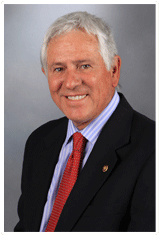JEFFERSON CITY — Many of you are aware of the concerns raised recently about the White River being named a National Blueway by the Obama Administration. For those of you who are not aware of the recent designation, here is brief account and timeline of what has occurred. In 2010, President Obama announced the America’s Great Outdoors Initiative and on May 24, 2012, then Secretary of the Interior Ken Salazar issued Secretary’s Order 3321 establishing the National Blueways System. In early 2013, the White River was established as the second National Blueway by the Department of the Interior. The National Blueways program was set up to employ “integrated land and water management techniques to conserve and restore a river from its headwaters to its mouth, and across its entire watershed.” In addition, the program states that “a large scale is needed… to successfully address 21st century challenges posed by changing patterns of resource use and climate.”
This description of the program immediately troubled me. When the federal government begins discussing land and water management, it usually means someone in a faraway place, like Washington, D.C., is issuing orders and regulations to people who live and work next door to the designated area. Most of us agree that we should be good stewards of the natural resources we have been given. Missouri is a beautiful state with many natural wonders that contribute to our state both recreationally and economically. The White River, a 700-plus mile body of water that runs from Arkansas into Missouri, is one of these natural treasures. The White River is important to many in the 29th District, from property owners to businesses to water enthusiasts. Most of us recognize that property owners, farmers, and businesses near the river are also vital to our economy in southwest Missouri. Therefore, these interests should be balanced and proposals and solutions made by cooperation of all those involved.
Here we encounter the first problem with this process: The people who would be most affected by this found out about it because of a government designation. This wasn’t something pursued by the people living and working around the river or even by their elected voice in Congress or in the State Legislature. Instead, federal agencies, working from the top down, imposed the designation without public input and, in large part, without public knowledge. No public meetings were held, no informational groups were formed, and no property owners within the watershed were consulted or informed.
This leads to the second problem: Of all the environmental interests and stakeholders involved, almost none of them were from Missouri and no groups representing or with in interest in property rights or property owners were included. It only seems obvious that those who potentially would be most affected by changes to the watershed, the property owners, should have a voice in the process and be considered when and if any decisions are made. If they had been consulted, I am sure property owners would have communicated their concerns about the designation’s effect on farming including use of their soil, treatment of their crops, and where their livestock can graze.
This leads to the third problem: The designation was written in such generalities that it could be interpreted very loosely and allow for unwanted federal oversight and intrusion in Missouri’s part of the White River. However well-intentioned these regulations might be, we recently learned from the TSA, the IRS, and the Missouri Department of Revenue what government regulation can become.
These concerns prompted many of you to get involved. You wrote letters, made phone calls, and organized meetings to educate your fellow citizens about this issue and the problems with it. I attended such a meeting a few weeks ago, and was convinced that the circumstances under which the White River National Blueway designation was made was not consistent with our democratic form of government where the people make these sort of determinations from the bottom up. Because of these grassroots efforts, I am pleased to report that the U.S. Department of the Interior rescinded the designation of the White River as a National Blueway. I am not opposed to voluntary conservation programs, but they should be done with the proper authority and with adequate public input. I want to commend our area federal delegation, Sen. Blunt, Congressman Long, and Congressman Smith, as well as my colleagues in the Missouri Senate and House who stepped up for Missouri and opposed the program.
It is important we continue to preserve the White River so it can serve our citizens and businesses alike and benefit future generations. But, any future efforts must start at the local level, include all the stakeholders, and be done in such a way that earns the public trust, not in a way that ignores it.
The Missouri Senate has continued to improve its website and provide information that is easily accessible and informative. A knowledgeable and informed citizenry will result in better public policy, better informed legislators, and more responsive government. I am always interested in hearing the thoughts and concerns of the people of the 29th Senate District, and I encourage anyone to contact my office if they have a comment or opinion, or would like more information about an issue or bill. You may contact me at the State Capitol as follows: (573) 751-1480; david.sater@senate.mo.gov; or by writing to Sen. David Sater, Missouri State Capitol, Room 433, Jefferson City, MO 65101. |



